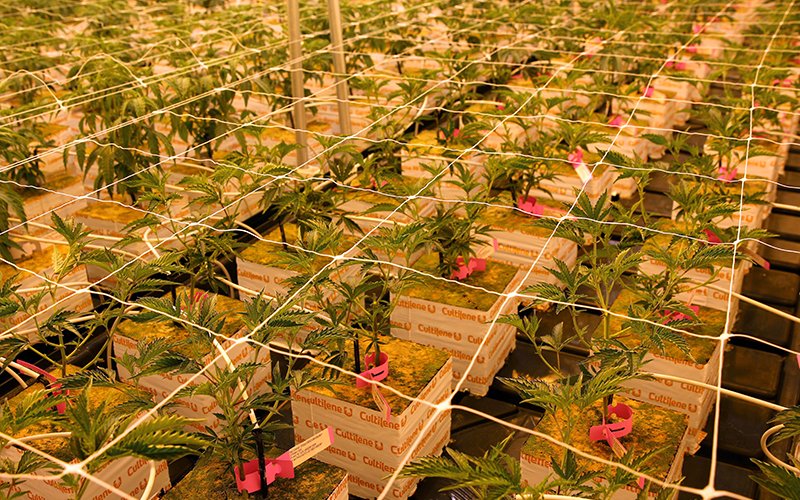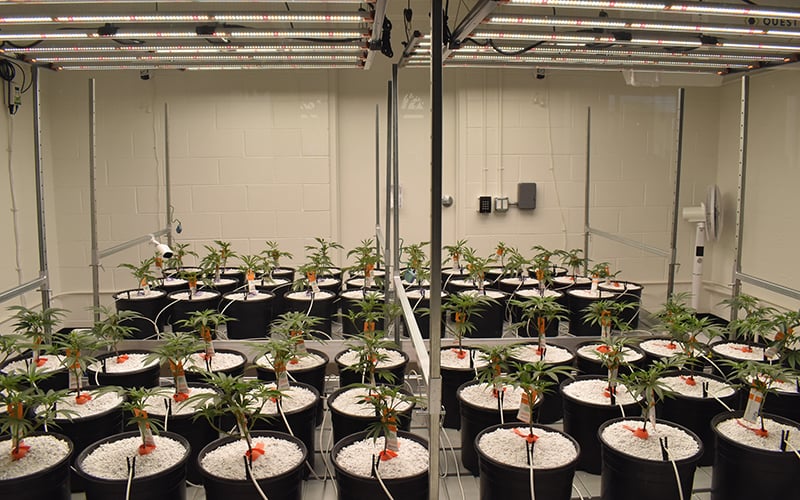
Cannabis plants in a grow room just inside SWC Arizona’s Tempe dispensary, where they’ll remain for a few months before being transferred to a local grow house to mature. (Photo by Kelly Richmond/Cronkite News)
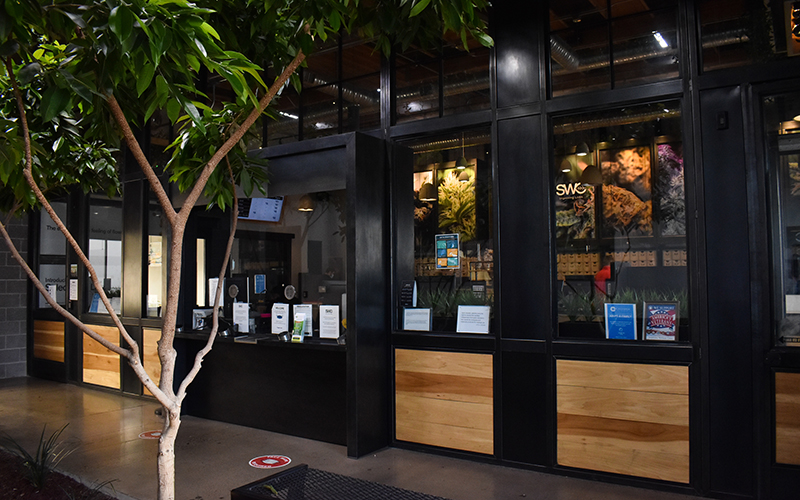
Behind the desk at SWC Arizona’s Tempe dispensary, prepackaged marijuana in several forms is sold. Recreational sales are subject to a 16% excise tax dedicated to underfunded programs in the state. (Photo by Kelly Richmond/Cronkite News)
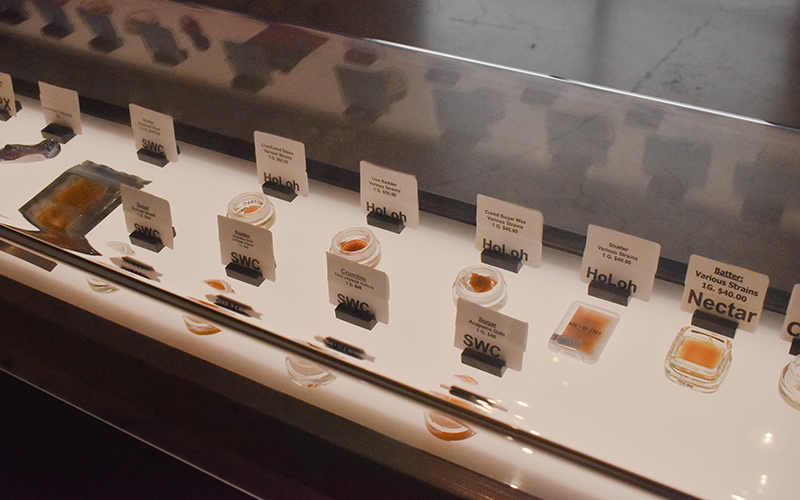
Marijuana products come in various forms, including edibles, concentrates and flower buds. These wax concentrates come in different strains, just as marijuana flower does. (Photo by Kelly Richmond/Cronkite News)
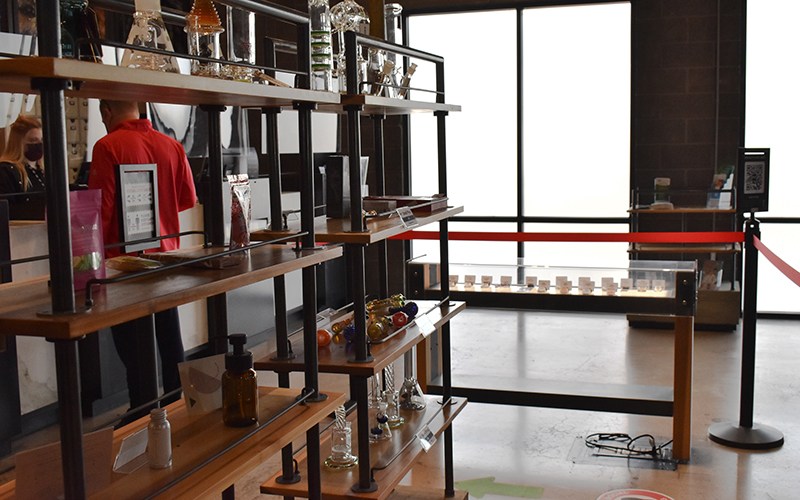
SWC Arizona’s Tempe store also sells pipes, topical products, vaporizers and THC concentrates. You must be 21 to buy recreational marijuana; 18 with a medical card. (Photo by Kelly Richmond/Cronkite News)
TEMPE – Sales of recreational marijuana are surging at Arizona retailers that, after selling medical marijuana for nearly a decade, now accommodate a crop of new customers the state estimates could push revenue to $1 billion in two years.
Dispensaries in the state started recreational sales Jan. 22, after Arizona became one of four states to legalize recreational marijuana in November. The Department of Health Services has issued more than 100 licenses for recreational sales, which totaled nearly $3 million in the first 10 days.
As the industry grows, questions persist on how it will affect local governments in Arizona that receive taxes, business owners, the people who need jobs – and those who get them. Nationally and locally, the marijuana industry lags in race and gender equity in ownership and the workforce.
Social equity in Arizona
Ownership, management and employees in the multibillion dollar U.S. marijuana industry are overwhelmingly white.
And the barriers to entry into the industry, including steep licensing fees and a lack of access to capital, persist, making it difficult for entrepreneurs from underserved communities to start.
The Arizona Department of Health Services, which grants marijuana dispensary licenses, is required to set aside 26 licenses for owners under a social equity ownership program. The licenses will go to those “from communities disproportionately impacted by the enforcement of previous marijuana laws,” in an effort to lessen the gap.
“It’s very expensive to get into this,” said Robin Reed, a principal partner in the business strategy company Emfluent. “Licensing can cost millions of dollars, and significant infrastructure is required to succeed in the cannabis industry.”
Cannabis remains federally illegal, so entrepreneurs can’t use government grants or bank loans to start a business. That leaves personal savings and family wealth as the most common sources of startup funding, according to Leafly.
“One of the significant financial barriers to entry for minorities in any business enterprise,” Reed said, “from cannabis to construction to real estate to finance, is many minority-owned businesses are started from personal savings.”
America’s racial wealth gap continues to leave disparities in access to capital. A 2016 study done by Brookings Institute found that the net worth of an average white family is nearly 10 times greater than that of a Black family.
The lack of access to funding results in an industry where 8 out of 10 of marijuana business owners are white, according to a 2017 study done by Marijuana Business Daily.
Although state-issued social equity licenses are designed to help remedy such disparities, Reed believes diversity efforts need to expand.
“They sound great when they are a news headline, but we really need to see what happens once it actually rolls out,” Reed said. “Are we seeing the diversity that was touted in the press? Or does it fall short of that?”
The state health department first needs to set standards on granting social equity licenses, but has not established a specific timetable to make that happen in an industry worth billions.
Only one dispensary, House of the Purp, is identified as Black owned in Maricopa County, according to a GoogleMaps search.
“A process for allocating the social justice licenses that are part of the law will follow a public involvement process to occur in the coming months,” Steve Elliot, a health department spokesperson, said by email.
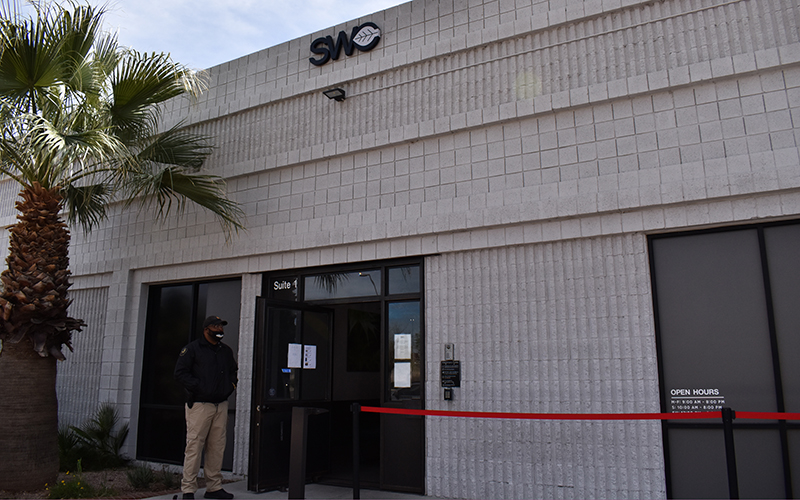
Eric Tolbert, who works security at SWC Arizona’s Tempe dispensary, waits to check IDs. Customers have to be at least 21 to buy recreational marijuana; 18 if they have a medical marijuana card. (Photo by Kelly Richmond/Cronkite News)
Disparities in arrests
Proposition 207 also included a provision that provides those with marijuana convictions a process to expunge their record. However, the extent of the effort will vary by county, and what it takes to do so isn’t clear.
Black people are 3.64 times more likely than white people to be arrested for marijuana possession, according to the American Civil Liberties Union.
Reed also emphasized the diversity problem is not unique to the marijuana industry and requires more than one program.
“A greater way to approach this is, ‘Is it progress? Are we heading in the right direction?’ Diversity, inclusion, equity, belonging – there is not a one-stop solution,” Reed said.
Morgan Fox, media relations director at the National Cannabis Industry Association, a national trade association, said social justice and equity is one of the industry’s biggest problems.
The association works to lobby and endorse bills on the federal level. In the past, the organization supported the Marijuana Opportunity and Reinvestment Act, which would decriminalize marijuana and expunge federal marijuana convictions.
Fox notices a prioritization of diversity in the industry, but also notes it is not universal, and each business is approaching it differently.
Harvest House of Cannabis, a Tempe marijuana company with locations in five states, tracks its demographics internally but declines to provide them publicly.
Steve White, the chief executive at Harvest, characterized the diversity of employees as “generally good,” with opportunities for improvement.
In 2019, Harvest fell under scrutiny of the Ohio Board of Pharmacy after claiming 51% of its Ohio operations were owned by “economically disadvantaged” groups.
At the time, White said, the company was financially backing a social equity applicant, Ariane Kirkpatrick, an African American woman, under a separate entity, Harvest Grows, according to news accounts.
But White was listed as the CEO and owner.
Harvest and the pharmacy board settled the licensing conflict last year through a $500,000 donation to the state’s prescription drug reporting database, which allowed the company to open three facilities in Ohio, according to the Cincinnati Enquirer.
Harvest continued to financially back Harvest Grows after the lawsuit, White told Cronkite News.
“We’ve seen that process through to conclusion at significant expense to the organization,” White said. “And we have done so through intense scrutiny and a lot of meddling into what was designed to be a prosperous business relationship.”
The company contributed $2 million to advocates behind Arizona’s Prop. 207, and pushed to include the process for expunging marijuana charges and the social equity licensing program, White said.
But as the social-equity license program gets underway in Arizona, White said the company is going to watch from a distance.
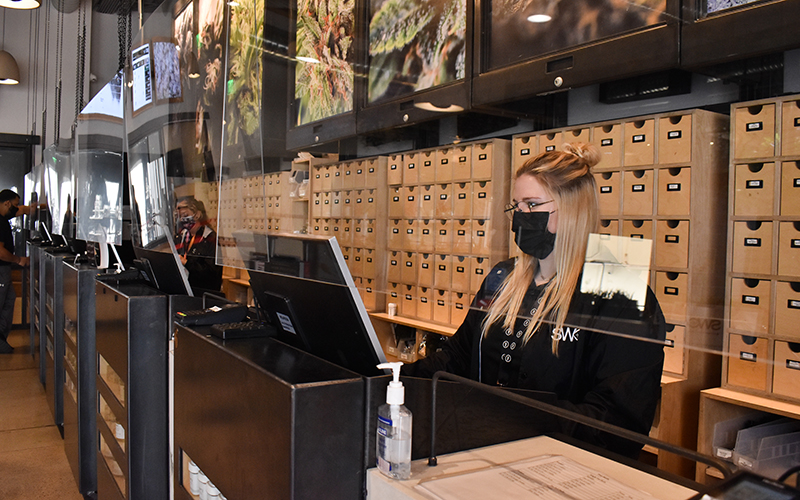
Budtenders at SWC Arizona’s Tempe dispensary advise customers on the effects of different strains of marijuana. (Photo by Kelly Richmond/Cronkite News)
Business growth and local taxes
The state health department has issued 130 licenses allowing dispensaries to begin recreational sales in-store.
Adult-use sales brought in $2.9 million in January, according to data from the Arizona Department of Revenue. And the state estimates revenue could reach more than $1 billion by 2023, according to estimates by the Arizona Joint Legislative Budget Committee. Its report cautions such estimates are “speculative and subject to change.”
The first heady days in January showed high demand and a high volume of in-store customers. At a Harvest House of Cannabis store in north Scottsdale, a line of about 30 people wrapped around the building on Jan. 22, soon after the health department granted approval for recreational sales at Harvest’s 15 locations.
“The line started developing pretty quickly, so people in Arizona are obviously very excited,” White said.
According to the Arizona health department, medical marijuana patients consumed about 106 tons of marijuana in 2020. The Leafly 2021 jobs report found Arizona brought in about $1 billion in sales.
Industry leaders anticipate sales will more than double in 2021 with the introduction of recreational sales. Those sales also are expected to bring economic changes for Arizona.
The state imposes a 16% excise tax, with revenue is to be distributed to community colleges, law enforcement, fire departments, the state’s Highway User Revenue Fund and a new Justice Reinvestment Fund, a data collection project focused on improving public safety and reducing corrections spending.
Impact on job market
Recreational sales also bring new jobs. The Leafly job report said the Arizona cannabis job market grew by 5,648 positions from 2019 to 2020, with many job offerings going up ahead of the launch of recreational sales in January.
“We’ve already hired literally hundreds of people for this particular moment,” White said. “We anticipate that that will continue.”
Harvest included people of color and women in its hiring, White said. SWC Arizona, whose parent company is Columbia Care, has a diversity and inclusion committee on the corporate level, and operates company wide training.
At least one Arizona company includes diversity statements on its website, but none include demographic information on employees, such as race or gender.
The influx of demand for marijuana and marijuana products comes at a time where high unemployment persists across the U.S. According to January data from the Bureau of Labor Statistics, unemployment in Arizona was at 6.7%.
Laura Potter, director of human resources at Health for Life, a medical dispensary with locations in Mesa and north Phoenix, expects to fill 20 to 25 positions in its Mesa stores alone but expects it to take a little more time.
“That number will probably go up even more as we get organized and get in our groove after we actually start selling for adult use,” Potter said. Health For Life plans to roll out recreational sales in March to better prepare for an expected influx of customers.
Potter said the cannabis industry, from production to retail, is expected to expand its workforce.
The job listings posted online for the marijuana industry include a range of workers – dispensary retail associates, cannabis cultivation specialists, armed security officers and delivery drivers. Salaries vary. ZipRecruiter estimates annual pay for a dispensary manager in Arizona ranges from $34,000 to about $80,000; entry-level positions pay minimum wage.
On the jobs site Indeed, former industry employees took to the reviews section to air grievances regarding certain dispensaries – many citing low pay.
Those entering entry-level positions must attain a Dispensary Agent Registration card, which requires fingerprinting and a background check. Applicants cannot have a federal drug conviction.
The dispensary typically applies for the dispensary agent card on behalf of the employee or volunteer, and the application fee is either taken on by the dispensary, or from the employee’s paycheck.
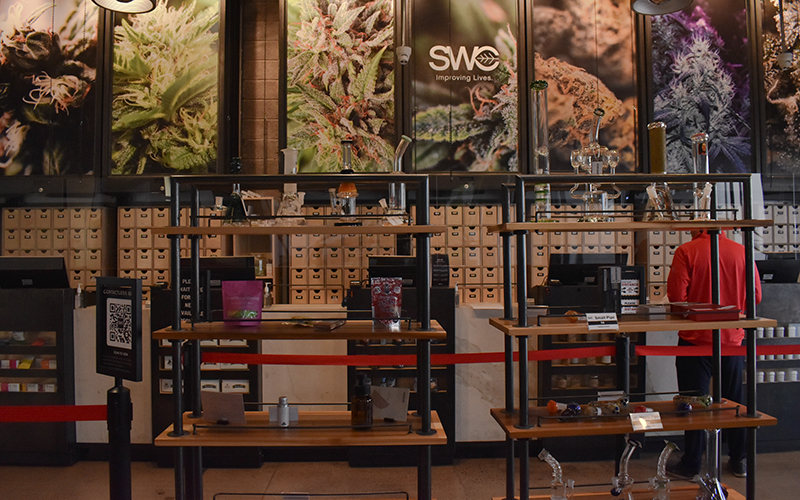
The main floor of SWC Arizona’s Tempe store displays pipes and edibles. (Photo by Kelly Richmond/Cronkite News)
More challenges ahead
Nationally, marijuana is anticipated to have an annual market value worth over $30 billion by 2025. But the ballooning industry still faces other challenges.
The rollout process in Arizona contrasts with other states who legalized recreational sales Nov. 3 – Vermont, New Jersey, Montana and South Dakota. Montana expects to start recreational sales in October, Vermont sometime in 2022, and South Dakota and New Jersey legislatures still are working on how to best approach legalization.
“The benefit for Arizona is that they get to see the success and sometimes failures of every state that has come before,” said Adam Goers, vice president of corporate affairs at Columbia Care, SWC’s parent company.
Some of the biggest challenges ahead include supply and demand, especially when rationing inventory between two separate clientele — medical patients and recreational users.
Medical marijuana has been legal in Arizona for nearly a decade for those 18 or older with a prescription.
Josh Gile, manager at the Health for Life North Phoenix location, saw more medical customers coming into Health for Life on the first few days of sales instead of their usual dispensary as nearby stores had lines out the door.
Those in the marijuana industry are also wary of inventory shortages. Many dispensaries bulked up ahead of the first day of recreational sale, though concerns still persist.
“People are running out of inventory, and now medical patients cannot get the medicine they need and have been using for several years,” Gile said.
In preparation, Health for Life, among multiple other dispensaries, grow houses and third-party vendors, is ramping up production and putting a protocol in place to prioritize medical patients.
“That way when we do go to (recreational sale), we don’t have to tell a medical patient who’s on their way to chemo and needs their edibles, ‘Sorry, we’re all out,’” Gile said.
Though multiple dispensaries have run into short-term inventory shortages, Goers believes SWC and other marijuana retailers will handle it.
“It’s growing pains,” he said. “There’s definitely going to be hiccups along the way when you turn on any new marketplace. Arizona isn’t going to be immune from that.”

